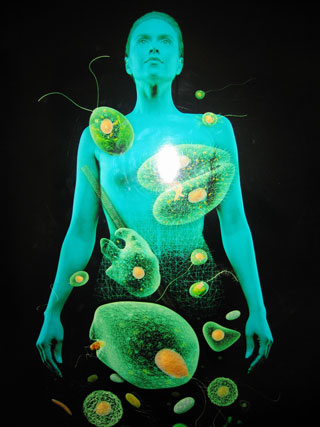-

-
Courses
Find courses by:
Collections
Cross-Disciplinary Topic Lists
- About
- Donate
- Featured Sites
This is an archived course. A more recent version may be available at ocw.mit.edu.

The experiences of the body contribute to the construction of identity for many people. (Image by Stefan Helmreich. Courtesy the Pierce Visitors Center at the Marine Biology Lab in Woods Hole, MA.)
Prof. Stefan Helmreich
21A.355J / STS.060J
Spring 2009
Undergraduate
If the twentieth century was the century of physics, the twenty-first promises to be the century of biology. This subject examines the cultural, political, and economic dimensions of biology in the age of genomics, biotechnological enterprise, biodiversity conservation, pharmaceutical bioprospecting, and synthetic biology. Although we examine such social concerns as bioterrorism, genetic modification, and cloning, this is not a class in bioethics, but rather an anthropological inquiry into how the substances and explanations of biology — increasingly cellular, molecular, genetic, and informatic — are changing, and with them broader ideas about the relationship between "nature" and "culture." Looking at such cultural artifacts as cell lines, biodiversity databases, and artificial life models, and using primary sources in biology, social studies of the life sciences, and literary and cinematic materials, we rephrase Erwin Schrödinger's famous 1944 question, "What Is Life?" to ask, in the early 2000s, "What Is Life Becoming?"
Helmreich, Stefan. 21A.355J The Anthropology of Biology, Spring 2009. (MIT OpenCourseWare: Massachusetts Institute of Technology), https://ocw.mit.edu/courses/anthropology/21a-355j-the-anthropology-of-biology-spring-2009 (Accessed). License: Creative Commons BY-NC-SA
For more information about using these materials and the Creative Commons license, see our Terms of Use.
